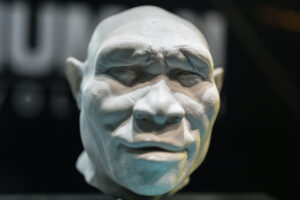We use the term “mouth-breather” to refer to people who aren’t smart. It remains an insult even though there are growing numbers of people who breathe through our mouths, if not when we’re awake, when we’re asleep. But I didn’t know breathing through the mouth was terrible for our health until I read James Nestor’s Breath. And I had no idea there was a link between mouth-breathing and chewing.
Apparently the problem started with the development of agriculture. Before humans grew our own food we had to chew everything we ate, and we had to chew it a lot. Consider what we ate before humans started growing wheat, rice and other grains.
- Plants, including roots, straight from the ground
- Wild game (These animals were almost all muscle and we chewed through gristle and bone)
- Nuts
- Seeds

Prehistoric humans spent hours a day chewing. And what did that chewing do for their physiology? It gave them wide, muscular jaws that kept their airways nice and open. It turns out the shape of the jaw/face has a direct impact on the shape of the nasal passageways and the throat. While the jaw stayed strong and wide, we had much less trouble breathing. But since the dawn of agriculture, our jaws have been shrinking as food has become increasingly processed.
Less chewing = narrower jaws = smaller airways = more difficulty breathing = mouth breathers.
By the time I was born in 1966, Americans had settled into an almost 100% processed food diet. The loss of our chewing muscle and bone caused our mouths to shrink which led to a lot of wisdom tooth removal. It also created an industry of orthodontics designed to straighten teeth that grew in crooked because there wasn’t enough room for them. I had braces as a child. I understood I’d caused my crooked teeth by sucking my thumb. Now I know my mouth wasn’t big enough for all the teeth to come in straight.
I also had my wisdom teeth removed as a teenager and that always seemed weird to me. Why would we grow more teeth than could fit in our mouths? How could it be that our bodies created problems for orthodontists to fix? They didn’t. We created our own problems by changing to food that our bodies weren’t designed for.
And yes, I grew up with kids who breathed through their mouths all day. Another part of the problem is that our noses are always eager to clog up. It’s very much a use-it-or-lose-it situation. I’ve noticed that when I’m sick with a cold or the flu, if I force air through my nose, it actually can stay open even through the worse of my symptoms. But if I give up and breathe through my mouth for just five seconds, the nasal passages slam shut and that’s the end of it. When our noses do that, it’s partly mucus blockage, but mostly it’s the nasal passages swelling up. Continuously keeping the nose in use trains the tissues to stay out of the way.
Nestor’s book gives many benefits for keeping our mouths shut and only breathing through the nose:
- The nose warms and pressurizes air, so the lungs extract oxygen more efficiently
- Cilia (tiny hairs) in the nose filter out particles and pollutants
- Blood pressure lowers
- Only the nose creates nitric oxide which increases circulation and helps get oxygen to cells (one reason we can absorb about 18% more oxygen through our noses than through our mouths)
What do you do if your mouth opens after you fall asleep? Here’s my post on mouth taping, a practice Nestor strongly recommends.
As we age our skulls naturally lose bone mass, plus we lose muscle. This causes the nose and throat passageways to get even smaller. That’s why so many of us snore, especially as we age: we’re having trouble getting air around our own flesh.
But one way to reverse the process — or at least keep it from getting worse — is to CHEW. Keeping the mouth shut is good, but even with my mouth taped shut, I still snore because my airways are so narrow. Here are some changes I’ve made recently:
- Chew gum 1-2 hours a day.
- Less chopping. Eg, I eat my nuts and fruits whole.
- More raw. Eg, after chewing gum for a few weeks, I started buying the big carrots (no more babies) and I crunch into them like Bugs Bunny.
- Less processed. Eg, if I want red meat, I purchase cuts of steak or roast, no more ground hamburger. And if I get a fatty cut, that’s fine because the more chewing the better.

It is possible to build bone in middle age, and even in old age. But it takes real commitment now that the typical American diet is mostly food that practically dissolves in the mouth.
There’s a direct relationship between how much we chew and how much we snore. I want to sleep better, breathe better, and get as many health benefits as possible out of every breath. So I now support the chewing gum industry (which has been shrinking in recent years). When I find the best gum — which gives me the best jaw workout with minimal sweetening — maybe I’ll blog about it.
Does Mouth Taping Work? I’m running the experiment.
Buteyko Breathing: Increasing the capacity of your lungs to extract oxygen.

Wow, chewing! What a surprise. Great that you shared the info. I’ve always liked chewing – now I’ve got a good reason to more of it.
Thanks, Regina. All tips are welcome!!